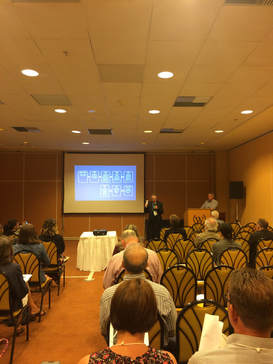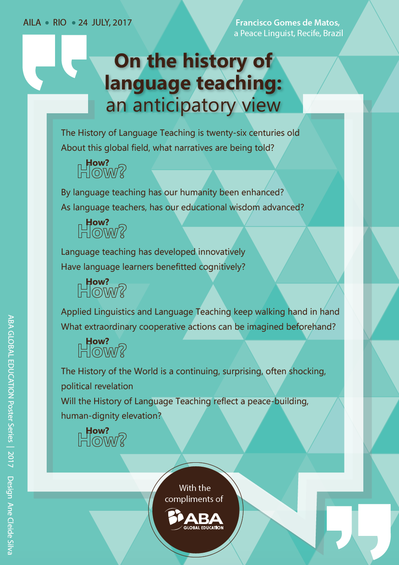
The HoLLTnet Symposium at the AILA Congress in Rio de Janeiro was successfully held on July 25. As planned, after a brief introduction by the two of us as HoLLT.net co-convenors and a few welcoming words from Francisco Gomes de Matos, the well-known Brazilian applied linguist (you can read the poem he penned for the occasion at the foot of this blog post), the different speakers regularly followed one another: 13 papers were read (only one had unfortunately to be cancelled). The audience – varying between 25 and 40 people during the different sessions – appreciated the variety of topics and methodological approaches, as evidenced by the lively discussions following the presentations. Our impression was that, despite the various languages and periods involved, all the speakers shared the idea that viewing foreign language learning and teaching through a historical lens could and did provide both interesting data per se and suggestions for present-day methodology and critical thinking on foreign language learning and teaching.
A key moment in the day was the mid-afternoon Research Network business meeting.
Everybody agreed on the idea of extending our network for another three years, which means that a new application to AILA will have to be submitted by October, and that hopefully we will all meet in the Netherlands (Groningen) in August 2020. It would be great, however, if we also met before that: we discussed the possibility of planning one or two workshops in 2018 and/or 2019, in order to strengthen our ties and possibly widen our group. This is also related to a proposal emailed to us, just a few days before the Rio congress, by Rachel Mairs, who would be ready to host us in Reading for a HoLLT workshop. Also, Mariarosaria Gianninoto said she might consider organizing a workshop in Grenoble. Further proposals, and suggestions for topics welcome!
Our group also commented on other emails we had received before the congress. It would be a good idea to have a blog as an addition to our HoLLT website (we have taken this to heart, and this post inaugurates the new HoLLT.net blog!. If anybody would like to write a guest post at any time, please contact us!), and also an online bibliography: can one of us – or perhaps one of our PhD students – volunteer to set the ball rolling?
Though desirable, it is likely to be difficult to seek public or private funding for our activities: thanks to Richard and, particularly, Barry O'Sullivan, our Symposium was part-sponsored by British Council Assessment Research & Development, and we are very grateful for that. But what about the future?
Finally, the possibility of making HoLLT.net into a more official, transnational organization, i.e. a formally constituted learned society, was considered but the group's general attitude to this was that, for now, we should concentrate on building the network as a relatively informal 'umbrella association' in its current form.
Giovanni Iamartino (Milan) and Richard Smith (Warwick)
A key moment in the day was the mid-afternoon Research Network business meeting.
Everybody agreed on the idea of extending our network for another three years, which means that a new application to AILA will have to be submitted by October, and that hopefully we will all meet in the Netherlands (Groningen) in August 2020. It would be great, however, if we also met before that: we discussed the possibility of planning one or two workshops in 2018 and/or 2019, in order to strengthen our ties and possibly widen our group. This is also related to a proposal emailed to us, just a few days before the Rio congress, by Rachel Mairs, who would be ready to host us in Reading for a HoLLT workshop. Also, Mariarosaria Gianninoto said she might consider organizing a workshop in Grenoble. Further proposals, and suggestions for topics welcome!
Our group also commented on other emails we had received before the congress. It would be a good idea to have a blog as an addition to our HoLLT website (we have taken this to heart, and this post inaugurates the new HoLLT.net blog!. If anybody would like to write a guest post at any time, please contact us!), and also an online bibliography: can one of us – or perhaps one of our PhD students – volunteer to set the ball rolling?
Though desirable, it is likely to be difficult to seek public or private funding for our activities: thanks to Richard and, particularly, Barry O'Sullivan, our Symposium was part-sponsored by British Council Assessment Research & Development, and we are very grateful for that. But what about the future?
Finally, the possibility of making HoLLT.net into a more official, transnational organization, i.e. a formally constituted learned society, was considered but the group's general attitude to this was that, for now, we should concentrate on building the network as a relatively informal 'umbrella association' in its current form.
Giovanni Iamartino (Milan) and Richard Smith (Warwick)

 RSS Feed
RSS Feed
